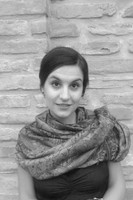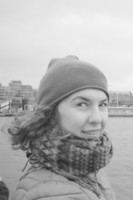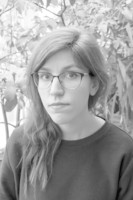Dora Komnenović
Dora Komnenović is a PhD candidate at Justus Liebig University, Giessen, and a freelance museum docent/ tour guide currently based in Berlin, Germany. She holds a BA in International Relations and Diplomacy (Trieste University, 2010) and an MA in Interdisciplinary Research and Studies on Eastern Europe (Bologna University, 2012). Dora's research interests revolve around Eastern European history and politics, with a special focus on the socialist period and the ensuing transition(s). Her dissertation project deals with post-Yugoslav memory and ethno-cultural exclusiveness in the 1990s. When she is not giving walking tours/ seminars in Berlin, you can find her in Rijeka, Forlì or Belgrade, unless she is exploring other parts of the world and/ or learning a new language.
Nikita Lomakin
Nikita Lomakin, PhD, works as archival researcher and project coordinator at the International Memorial (Moscow). As a researcher, he participated in creating such exhibitions as “Fair enough” (2014, Venice Architecture Biennale) or “Right to correspondence” (2016, International Memorial). He was also curator of the traveling exhibitions “Different Wars. National School Textbooks on WWII” (2016-2018) and “Postscriptum. Eastern workers in the Third Reich” (2018). He coordinated the creation of several digital archives, e.g. fond21.memo.ru (collection of documents of former Ostarbeiter), tastorona.su (collection of oral testimonies on WWII) and warandpeasants.ru (collection of interviews on the memory of peasant uprisings in Soviet Russia). Now he is working on digitizing the International Memorial archive and introducing new media for publishing archive material (as boardgames, video games, cartoons and audio podcast).
Kamila Radecka-Mikulicz
Kamila Radecka-Mikulicz – museum professional, interpreter, narrative exhibitions designer. She has worked in POLIN’s Exhibition Department since 2016, where she is developing the core exhibit and is curating an upcoming temporary exhibition devoted to Muranów, a district in Warsaw. 2013–2016, she worked in an architecture bureau and multimedia agency as interpreter and content designer, developing both analogue and digital content for narrative exhibitions, among others: Freedom Express for European Network Remembrance and Solidarity, Energetic Center of Science. 2009–2013, she was a member of the Holocaust Gallery curatorial team at POLIN Museum of the History of Polish Jews. Graduate of the Warsaw University, holds an MA in philosophy. PhD candidate at the Institute of History of Polish Academy of Science, where she is working on her thesis on the interwar Jewish community in Chełm.
Natalia Sineaeva-Pankowska
Natalia Sineaeva-Pankowska studied media at the Moldova State University and sociology at the Centre for Social Studies at the Polish Academy of Sciences (Warsaw) and at the Lancaster University. She is also a graduate of the POLIN Academy, a post-graduate course for museum educators and professionals in Jewish history, culture, museology and creative education. She is now a PhD candidate in sociology studying Holocaust negationism and national identity in Moldova and Eastern Europe. Her experience includes work at the POLIN Museum in Warsaw as well as cooperation with museums in Moldova and across Eastern Europe. She is a member of the public council at the Baby Yar Memorial Center project in Kiev, Ukraine. She is also project coordinator at the “Never Again” Association, which deals with the commemoration of the Holocaust and other genocides as well as contemporary issues of diversity and tolerance.
Feedback
"The programme experience gave me a very good overview of existing curatorial practices and approaches to exhibition making mostly in Poland but also beyond it. And at the same time the programme encouraged us to find our individual ways and methods to elaborate our exhibition concepts and narratives.
I found it very helpful and useful for our museum project in Moldova.
I also appreciate the possibility of in-depth analysis of exhibitions from varied perspectives in the group and with curators.
The logistics and contact with the programme staff were excellent too."
Ondřej Táborský
Ondřej Táborský works as a curator at the Department of Modern Czech History of the National Museum in Prague where he authored and co-authored number of smaller and larger exhibitions (Redmuseums 2011, Second Life of Hussite Movement 2016, Retro 2016). Trained as a historian at the Charles University (Mgr. degree, 2008) his research interests are: the beginnings of the consumer society in communist Czechoslovakia, namely trade, consumption discourse and advertising. In September 2016 he received PhD degree in Czech History, also at the Charles University in Prague. Since January 2018, he has been the leading investigator of a three-year research project Cosumer Imagination of the Communist Dictatorship. Czechoslovak Advertisement in the Post-war Era.
Marija Vasiljević
Marija Vasiljević graduated and received a master's degree from the Department of Art History, Faculty of Philosophy – University of Belgrade. She is currently a PhD student in Museology and Heritology at the same faculty. Since 2012, she has been working at the Museum of Yugoslavia on different projects as a research assistant (exhibition Yugoslavia from Beginning to the End), a publication editor (catalogue Art as Resistance to Fascism) and a digitisation assistant. She is a coordinator for documentation and digitisation at the Museum of Yugoslavia and a coordinator of the digitisation project Visual Archive Yugoslavia (University of Basel/ Museum of Yugoslavia) on the museum’s behalf. She is also an associate at The Center for Museology and Heritology (Faculty of Philosophy Belgrade) and a co-founder of NGO Views Research Network. As an associate of the Centre, she is co-author of the exhibition The Hero’s Life and Death about Ivo Lolo Ribar, People's Hero of Yugoslavia. Her research interest are cultural memory of the socialist period in Yugoslavia, museum and heritage theory, museum documentation and digitisation.
Franek Zakrzewski
Franek Zakrzewski studied history at the University of Warsaw. From 2010 to 2015 he was a member of the curatorial team for the Core Exhibition of the Museum of the History of Polish Jews POLIN. Since the exhibition opening, he has been collaborating with different museums, among others the Frankfurt Jewish Museum and the Royal British Columbia Museum. He also works as a content designer in the field of exhibition designing, and a researcher for documentary films. He is also a member of the editorial team for publishing the collection of the Underground Archive of the Warsaw Ghetto - Ringelblum Archive. In 2016, in collaboration with Maria Ferenc, he published Radio monitoring in the Warsaw Ghetto.





